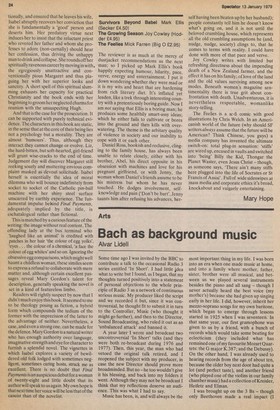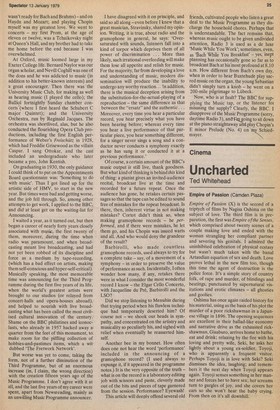Bach as background music
Alvar Lidell
Some time ago I was invited by the BBC to contribute a talk to the occasional Radio 3 series entitled 'In Short'. I had little idea what to write but I found, as I began, that my thoughts turned positively into a statement of personal objections to the whole principle of Radio 3 as a network of continuous serious music. My producer liked the script and we recorded it but, since it was controversial, he thought fit to submit it in turn to the Controller, Music (who thought it might go further), and then to the Director, Sound Broadcasting, who ruled it out as an 'unbalanced attack' and banned it.
A year later I wrote and broadcast two uncontroversial 'In Short' talks (and they were both re-broadcast during 1976 and 1977). Then, this year, the man who had vetoed the original talk retired, and I reopened the subject with my producer, in case the new Director should prove more broadminded. But no —he too wouldn't give it his blessing, and back into my folders it went. Although they may not be broadcast I think that my reflections deserve an audience. This was what I had to say.
Music has been, is, and will always be the most important thing in my life. I was born into an era when one made music at home, and into a family where mother, father, sister, brother were all musical, and between us we played several instruments besides the piano and all sang — though I never actually heard the best voice (my mother's) because she had given up singing early in her life. I did, however, inherit her mezzo-soprano songs for my own baritone, which began to emerge through lessons started in 1925 when I was seventeen. In that same year, our first gramophone was given to us by a friend, with a bunch of records which would take some beating for eclecticism (they included what has remained one of my favourite Mozart Quartets: the G major K.387; and the Debussy). On the other hand, I was already used to hearing records from the age of about ten, because the older boy next door had quite a lot (and perfect taste), and another friend (who played one of the violins in our family chamber music) had a collection of Kreisler, Heifetz and Elman.
I was brought up on the 3 Bs — though only Beethoven made a real impact (I wasn't ready for Bach and Brahms) — and on Haydn and Mozart; and playing Chopin myself was my greatest love. We went to concerts — my first Prom, at the age of eleven or twelve, was a Tchaikovsky night at Queen's Hall, and my brother had to take me home before the end because I was overwhelmed.
At Oxford, music loomed large in my Exeter College life. Bernard Naylor was our organ scholar, and Nevill Coghill was one of the dons and he was addicted to music (in addition to his better-known interests) and a great encourager. Then there was the University Music Club, for making as well as hearing music (I played the cello); the Balliol fortnightly Sunday chamber concerts ..(where I first heard the Schubert C major Quintet); and the University Orchestra, run by Reginald Jacques. The orchestra was shortlived, alas, but he also conducted the flourishing Opera Club productions, including the first English performance of Weber's Freischiitz in 1928, which had Freddie Grisewood as the villain Caspar. I sang Ottokar, and the cast included an undergraduate who later became a pro, John Kentish.
On graduating in 1930, the only guidance I could think of to put on the Appointments Board questionnaire was: 'Something to do with music'. Thus I got lined up for the artistic side of HMV, to start in the new year. But times were bad and getting worse, and the job fell through. So, among other attempts to get work, I applied to the BBC, and did at least get on the waiting-list for Announcing.
I waited a year, as it turned out, but then began a career of nearly forty years closely associated with music, the first twenty of them, moreover, during the time when radio was paramount, and when broadcasting meant live broadcasting, and had not yet been robbed of its discipline and force as a medium by tape-recording, (which has a bad effect on artists, making them self-conscious and hyper-self-critical). Musically speaking, the most memorable time was announcing for the Third Programme during the first five years of its life, when the world's greatest artists were brought to our studios (or relayed from concert-halls and opera-houses abroad),. and helped to nourish with live broadcasting what has been called the most civilised cultural innovation of the century.. Shame on the BBC philistines and iconoclasts, who already in 1957 hacked away a. quarter from the feet of this monument, to. make room for the piffling collection of hobbies-and-pastimes items, which a wit. dubbed 'The Fretwork Network'.
But worse was yet to come, taking the form, not of a further diminution of the Third Programme, but of an enormous increase (in, I claim, the wrong direction) with the creation fifteen years ar of the Music Programme. I don't agree with it at all, and the last five years of my career were spent, apart from Newsreading, mainly as an unwilling Music Programme announcer. I have disagreed with it on principle, and said so all along —even before I knew that a great musician, Stravinsky, shared my opin ion. Writing, it is true, about radio and the gramophone in general, he says: 'Oversaturated with sounds, listeners fall into a kind of torpor which deprives them of all power of discrimination . . . More than likely, such irrational overfeeding will make them lose all appetite and relish for music.
For the majority, far from developing a love and understanding of music, modern dis semination will produce the inability to undergo any worthy reaction... In addition, there is the musical deception arising from the substitution-for-the-actual-playing of a reproduction — the same difference as that between the "ersatz" and the authentic. . . Moreover, every time you hear a particular record, you hear precisely what you have been hearing before; whereas every time you hear a live performance of that par ticular piece, you hear something different, for a singer never sings a song and a conductor never conducts a symphony exactly as he has sung it or conducted it at a previous performance.'
Of course, a certain amount of the BBC's music output is still live, thank goodness.
But what kind of thinking is behind this kind of thing: a pianist gives an invited-audience recital, broadcast live at the time and recorded for a future repeat. Once the audience has gone, he retakes certain passages so that the tape can be edited to sound free of mistakes for the repeat broadcast. Is there, then, inherent virtue in not making mistakes? Cortot didn't think so, when making gramophone records — he performed, and if there were mistakes, he let them go, and his Chopin was issued warts and all. And who would deny the grandeur of the result?
Barbirolli, who made countless gramophone records, used always to try for a complete take — say, of a movement of a symphony — in order to preserve the value of performance as such. Incidentally, I often wonder how many, if any, retakes there were in what I consider the most wonderful record I know — the Elgar Cello Concerto, with Jacqueline du Pre, Barbirolli and the LSO?
Did we stop listening to Menuhin during that trying period when his flawless techni que had temporarily deserted him? Of course not — we shook our heads in sympathy, and concentrated on the artistry and musicality so peculiarly his, and sighed with relief when eventually he reasserted himself.
Another bee in my bonnet. How often does one not hear the word 'performance' included in the announcing of a gramophone record? (I used always to expunge it, if it appeared in the programme notes.) It is the very opposite of the truth — what is on the record is a laboratory editing job with scissors and paste, cleverly made out of the bits and pieces of tape garnered from the session, Performance? Eyewash! This article will deeply offend several old friends, cultivated people who listen a great deal to the Music Programme as they discharge the household chores. Perhaps that is understandable. The fact remains that, whereas music ought to be given undivided attention, Radio 3 is used as a de luxe 'Music While You Work'; sometimes, even, as 'Bach While You Breakfast' — yes, inept planning has occasionally gone so far as to broadcast Bach at his'inost profound at 8.10 a.m. How different from Bach's own day, when in order to hear Buxtehude play sacred music on the organ, the young Sebastian didn't simply turn a knob — he went on a 200-mile pilgrimage to Lubeck.
Now, who is at fault? The BBC for supplying the Music tap, or the listener fox misusing the supply? Clearly, the BBC. I disapprove of the Music Programme (sorry, daytime Radio 3), an&Iagoing to sit down at the piano straightaway alit play Chopin's E minor Prelude (No. 4) on Schiedmayer.



































 Previous page
Previous page